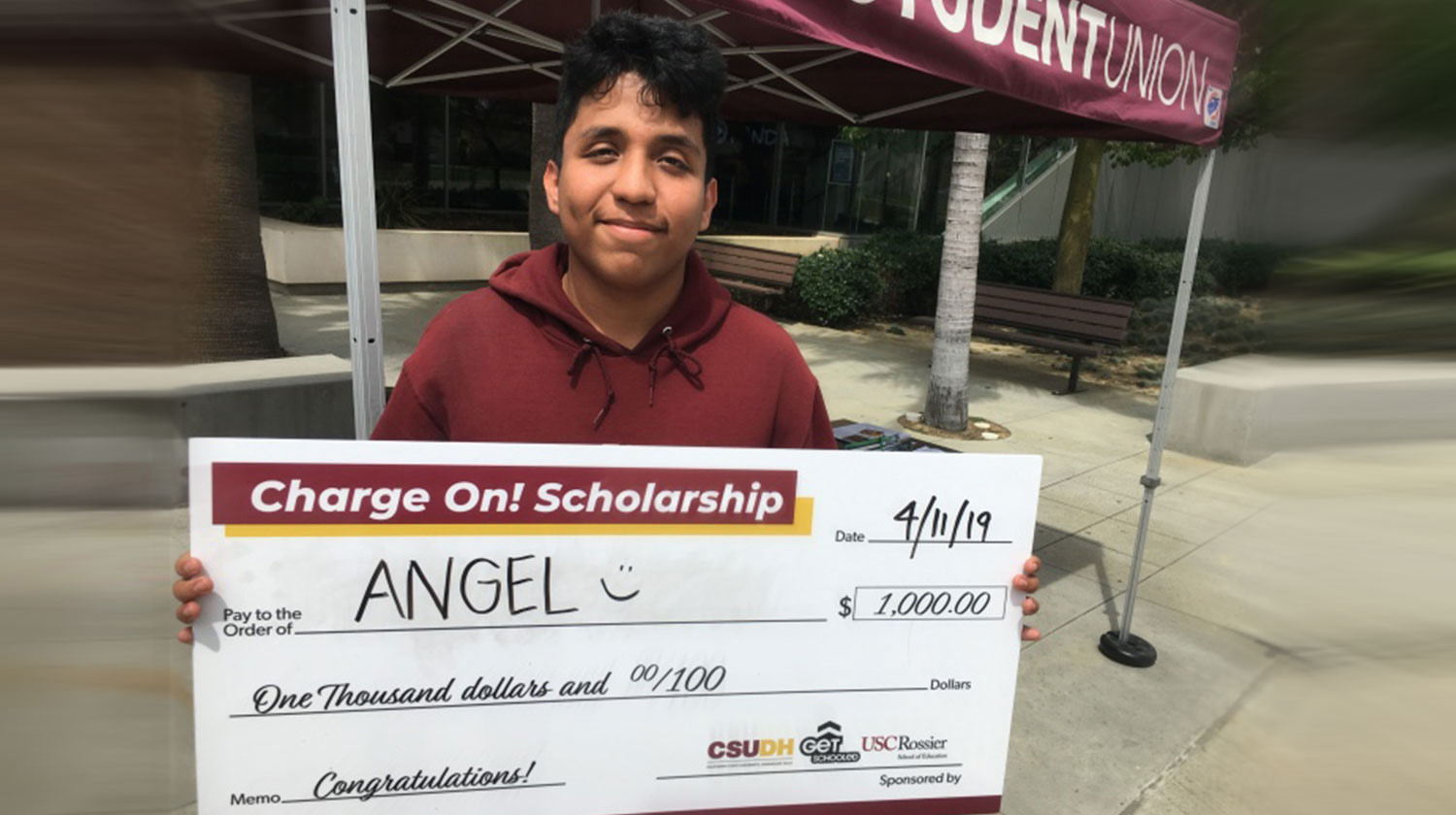
Cal State Dominguez Hills signed on last fall to be the test site for Charge On, a program that uses students’ online social gaming skills to guide them to academic, financial, and wellness help.
Nearly a third of this campus’ freshman class signed up for the program. Many of them had serious struggles during their first semester.
“I thought there was nobody to go to or I was just basically alone,” said freshman Evelyn Montes, a graduate of Fremont High School in South L.A. who is majoring in psychology, hoping to work as a student counselor. The difference between the academic expectations of high school and college was too much.
“I felt too overwhelmed and I was, like, maybe this isn’t for me,” she said. She considered dropping out.
But then she found Charge On. She earned points by reading about the benefits of getting a good night’s sleep and tips on how to reduce stress, among other topics and she received texts each week encouraging her and reminding her about deadlines. She’s racked up 15 badges and 30,000 points, and has become one of the top players in the program.
BADGES, BADGES AND MORE BADGES
Charge On uses points and badges that are a lot like FarmVille and other online social games, to reward users and keep them engaged. Players earn rewards for learning about how to adapt to college’s academic, financial, and social challenges.
At first glance, the platform looks like a regular web page, but click on the “I Ain’t Stressing” section and you’ll see a list of eight tasks that will each earn you a badge. One of the tasks is to watch “3 Youtubers Who Can Help You Destress,” which is worth 25 points. To earn the “Raise Your Grades” badge, you’ll have to read the “3 Study Tips To Trick Your Brain” article for 25 points. Completing all of the “I Ain’t Stressing” tasks brings in 1,000 bonus points.
“Completing more badges means getting more points – the more points you gain, the more prizes you can get. So that was the other general idea that made it fun as well,” said Angel Salvador, a political science major.
Salvador has read most of the Charge On posts. That’s earned him more than two dozen badges and 40,000 points. As top players, he and Montes were each awarded a $1,000 scholarship last week by Charge On’s creators who visited the campus. Salvador had a big smile as he held the oversize check in front of the student union building at Dominguez Hills.
THOUSANDS DROP OUT EACH YEAR
Salvador and Montes could have been two of the hundreds of freshmen who drop out of Cal State Dominguez Hills each year. In 2017, 364 dropped out, representing 21.8% of the freshman class. Throughout the entire 23-campus Cal State system, 10,630 students dropped out in 2017 – that’s 16% of the freshman class. Drop out rates for black and Latino freshmen are higher.
Administrators say students’ reasons for dropping out vary, but most have to do with money and academic problems, as well as struggles to connect with the college culture.
“I was a recent graduate from high school, and I wasn’t used to being in such a wider area with new friends, and people,” Salvador said. One of the problems, he said, is that he commutes 21 miles to the campus from his parents’ house in Anaheim.
Legislators as well as Cal State and campus administrators are spending millions of dollars each year to retain students like Salvador and lead them to graduation.
“It’s definitely in the public interest because there are economic benefits to a college education, both for individuals and for the state,” said Cal State Sacramento education researcher Colleen Moore.
Charge On is not part of the Cal State system’s $75 million a year initiative to reduce the number of dropouts and increase graduation rates. However, the program’s use of students’ digital engagement to help their college careers appears to be complementing the work of university administrators.
“Where I might be concerned is wanting to see [that] the institutions using these approaches are not just adding a layer of technology that tries to feed students some information, or direct students to resources on campuses without examining the effectiveness of those resources,” Moore said.
Dominguez Hills administrators say they hired four full-time advisors this year and 12 part-time peer mentors to help struggling students.
USC School of Education Professor Zoe Corwin is the lead researcher behind Charge On. She said the project is producing a lot of data and her team is looking at how effective those resources are.
SOCIAL GAMES FOR SOCIAL GOOD
Charge On reached a milestone last week. On a quarterly visit to the campus to talk to students who signed up and reward them for using the platform, the program’s researchers said initial data suggests positive results.
“We are showing that if students participated in the online campaign, they had higher rates of persisting to the next semester,” Corwin said.
She believes many of the policy discussions about improving college student graduation rates in Sacramento or within the CSU system office lack consideration on the personal skills students can use after graduation. Corwin believes Charge On’s resources help students learn those skills.
“Are they thriving, are they feeling happy on a college campus and then are they able to make connection to the next step?” Corwin said.
LAist thrives one member at a time. Local journalism counts on you.
Becoming a sustaining member – giving $5/month or $10/month makes a huge difference for our ability to report on your city. Think about what you pay for Spotify, Netflix, or your monthly dog treat delivery service. You know independent news for your whole community is worth it. Be one of 500 readers to step up before May 15th to unlock a $10,000 challenge. You can power local journalism on LAist.
Source: LAist